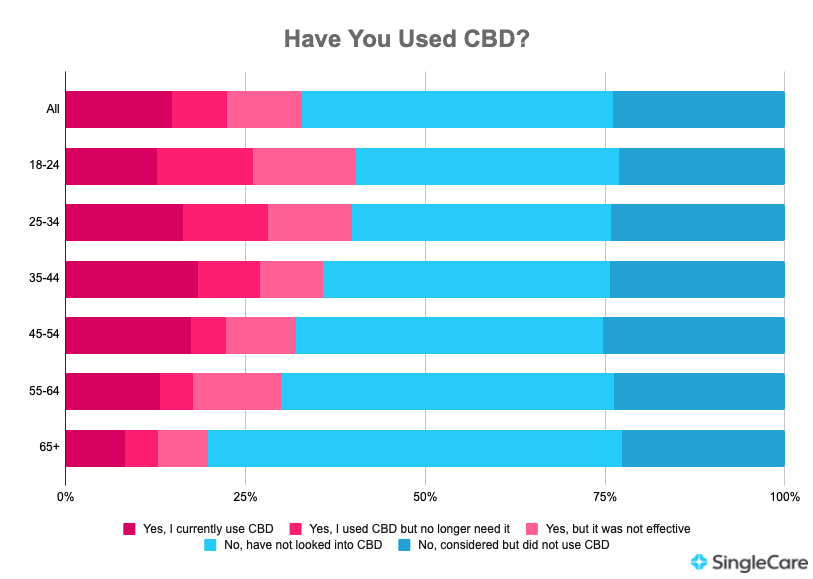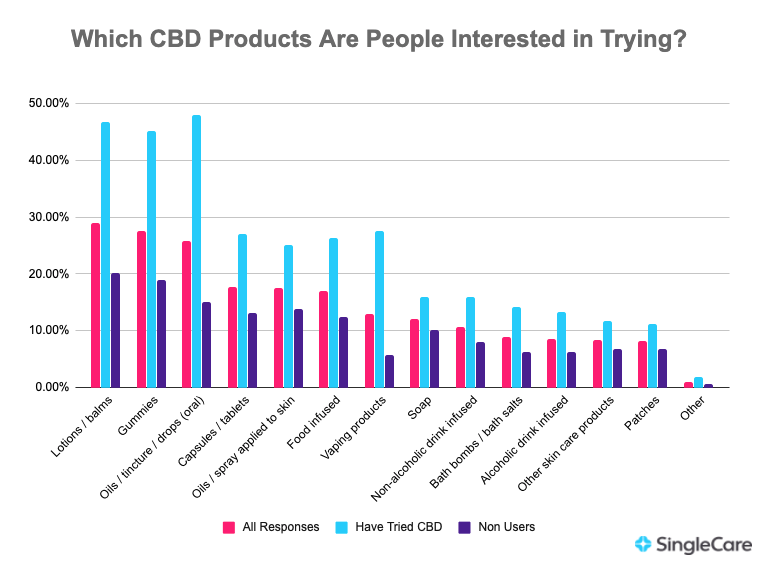REC articles are not the view or opinion of Alpha Extract Administrators
The 2020 CBD survey.
The 2020 CBD survey
With all this information (and misinformation) it’s hard to get a general consensus on CBD therapy. Ask 20 people on the street what they think of CBD, and you’ll likely get responses that range from “it changed my life” to “you couldn’t pay me to try it” or “what’s CBD?” But ask 2,000 people and you’ll paint a pretty vivid picture of CBD use in America, which is exactly what SingleCare did in its CBD survey.
Summary of CBD survey results:
- 33% of Americans have used CBD
- 47% of Americans think the government regulates CBD
- 32% of people who’ve used CBD have not found it effective
- 64% of current CBD users use CBD for pain relief and inflammation
- 36% of people use CBD in addition to a prescription
- 45% of current CBD users have increased their use of CBD since the global coronavirus pandemic
- 26% of current CBD users are stocking up on CBD products due to potential shortages from COVID-19
- CBD based products with the most interest include lotions/balms, gummies, oils (oral drops and topical sprays), and capsules/tablets
- The largest deterrents preventing people from trying CBD include lack of trust in the manufacturers and lack of belief in the benefits
What is CBD?
There are plenty of misconceptions about what, exactly, CBD is. CBD is short for cannabidiol, a naturally-occurring compound found in the cannabis plant. Contrary to what some might think (including 26% of survey respondents), CBD is not the same as marijuana.
Hemp and marijuana are from the same family but aren’t the same plant. Both contain the cannabis compounds CBD and THC, however, hemp has higher CBD and lower THC than marijuana. CBD is non-psychoactive while THC produces psychoactive effects. In other words, CBD won’t get you high like marijuana will because it does not contain THC. Additionally, CBD shows no potential for abuse or dependence, according to the world health organization (WHO).
Is CBD legal?
Yes, but only in certain cases. The Agriculture improvement Act of 2018 legalized CBD products derived from hemp from a licensed grower that has 0.3% or less THC. CBD products derived from marijuana are not legal under federal law—even though several states have legalized and decriminalized marijuana.
The Food abd drud adminastration has approved only one CBD medication for medical use, Epidiolex, which is a “drug substance CBD for the treatment of seizures associated with Lennox-Gastaut syndrome or Dravet syndrome in patients 2 years of age and older.”
Many Americans have misconceptions about CBD
CBD’s affiliation with marijuana has led to numerous misconceptions about CBD products. For example:
- 26% of Americans think that CBD is the same as marijuana. CBD products are derived from hemp. While it’s in the same family as marijuana, it’s not the same thing and it won’t get the user high.
- 57% of Americans believe that CBD will show up on a drug test. This, too, is untrue… mostly. Products that are pure CBD and are labeled 0% THC should not show up on a standard drug test. However, due to lack of regulation of these products, it’s possible the product could contain trace amounts of THC, despite the 0% label. Products that contain 0.3% are unlikely, but possible, to show up on a drug test.
- 47% of Americans think the government regulates CBD. Currently, CBD isn’t federally regulated, as it’s a supplement and not a medication. But that could change soon as laws around hemp and marijuana are rapidly evolving.
33% of Americans have used CBD products
Who uses CBD products? More Americans than you might think. A 2019 Gallup Poll found that 14% of Americans use CBD, while one-third of our respondents said they currently use or have used CBD products.
Younger crowds appear more open to CBD use—it’s most common in the 18 to 24 and 25 to 34 age groups. Surprisingly, among the people who have used CBD products, 35- to 44-year-olds are the group most likely to continue using them, while younger people often use them for a short period of time, then stop. These numbers taper off in older populations. 70% of respondents aged 55 to 64, and 80% of respondents aged 65 and older said that they have never used a CBD product.
Why don’t people try CBD?
- 22% don’t trust the product or manufacturer
- 22% believe it won’t help them
- 8% worry it will make them high
Even so, with their growing popularity and accessibility, Americans of all ages are beginning to test out CBD products for a variety of medical conditions.
Americans use CBD for a wide variety of conditions
A quick Google search for CBD will hit you with a wave of websites touting various uses, health benefits, and cures. Compared to long-standing medications and pharmaceutical mainstays, there are very few studies on CBD’s potential uses and effects. While it has shown some initial promise treating a variety of ailments, it’s still new and clinically unproven. CBD results vary from person to person
There are a ton of variables in play here. You’ve got a diverse array of products, hemp strains, administration routes, doses, and conditions. As a result, people have a wide range of experiences with CBD products.
Out of our respondents, 32% of people who have used CBD found it ineffective. A 68% success rate isn’t bad, but researchers are hoping to improve it by finding more consistent treatment types. Industry pioneers like Tony Spencer, founder of Spruce CBD are currently seeking answers.
“Further research was conducted and found effective results came from getting a sufficiently high dose, use of a superior method of intake such as tincture under the tongue, and avoiding isolate,” says Spencer. “However, the single biggest factor for getting significant positive results came from using a quality strain of hemp.”
As experts continue gaining knowledge through studies and clinical trials, we might see more standardized and predictable products hit the CBD market.
Americans are open to trying various CBD products
You can put CBD in just about anything. If you like coffee, how about a CBD latte? Or, take a relaxing bubble bath to the next level with a CBD bath bomb. There are products for nearly every part of your life. That said, some of the most popular CBD products are more typical medical administration routes like topical lotions or balms and oral tablets.
Nearly 50% of people who have used CBD prefer oils/tinctures, lotions/balms, and gummies. And those who haven’t tried it are more open to these products as well.
- 29% of people are interested in CBD lotions and balms
- 28% of people are interested in CBD gummies
- 26% of people are interested in CBD oils/tinctures/drops (oral)
- 18% of people are interested in CBD capsules/tablets
- 18% of people are interested in CBD oil sprays (topical)
- 17% of people are interested in CBD-infused food (e.g., CBD chocolate)
- 13% of people are interested in CBD vaping products
- 12% of people are interested in CBD soap
- 11% of people are interested in CBD-infused drinks (non-alcoholic)
- 9% of people are interested in CBD bath bombs and bath salts
- 9% of people are interested in CBD-infused alcoholic drinks
- 8% of people are interested in CBD skincare products
- 8% of people are interested in CBD patches
- 1% of people are interested in other CBD products
CBD is becoming a popular supplement to medications
People have been supplementing prescriptions with natural remedies for years now. CBD is no different.
- 36% of people use CBD in addition to a prescription
- 32% of people use CBD in addition to other natural remedies
- 19% of people use CBD instead of other natural remedies
CBD can have interactions with other drugs, especially Clobazam and Valproate, so anyone considering CBD products should speak with a doctor before proceeding.
Americans are upping their CBD use due to COVID-19
Stay-at-home orders and potential long-term effects of the coronavirus pandemic have people looking to stock pile medications, and CBD is no exception. In fact, 26% of current CBD users were stocking up on products in anticipation of shortages due to the coronavirus outbreak. CBD sales spiked 230% prior to shelter-in-place orders.


